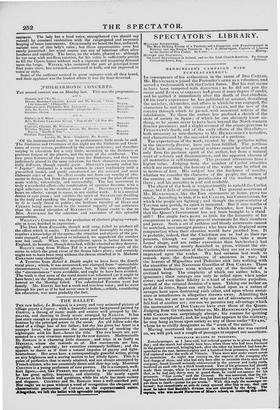'PHILHARMONIC CONCERTS.
THE second concert was on Monday last. This was the programme— ACT I. Sinfonia in C (No. 6) MOZART. Duetto, Madame CARADORI ALLAN and Mr. 11.4,1.ga, 0 Vieni, i for tormenti " (Euryanthe) WEISER. Concerto in G, Pianoforte, Mrs. ANDEasov BEFTHOVEN. Aria. Mr. HALVE, " Fenno rimauti" (Guylielmo Tel!) Hessrm. Overture, Oberon WEISER.
ACT II.
Sinfonia in C Minor
Aria, Madame CARADORI ALLAN, " Non mi dir (II Don Wo- BEETHOVEN.
rm° MOZART. Concerto, Clarinet, Mr. WILLMAN WEBER. Terzetto, Madame CARADORI ALLAN. Mr. BRIZZI, and Mr B•LFE. " Quell() di Tito " MOZART. Overture Tamerlane WINTER.
Leader, Mr. Motti—Conductor, Mr. BISHOP.
Of the instrumental music, or its performance, little needs be said. The Sinfonias and Overtures of this night are the Sinfonias and Over-
tures of every season, performed by the same orchestra ; and therefore varying in execution but a very little, according to the freshness or previous fatigue of the players, and the taste of the conductor. The two great features of the evening were the Sinfonias ; and they were judiciously placed in the same selection, for their characters are essen- tially different, though equally great. MOZART'S (usually called his " Jupiter" Sinfonia) is a work written in exact conformity with a prescribed model, and partly constructed on the severest and most elaborate rules of art. Its effect results not from any novelty of cha- racter in design, but from the power of carrying out the plan of others more widely, extensively, and successfully. The last movement is truly a wonderful effort—the combination of sportive freedom with a rigid adherence to the straitest rules of art. BEETHOVEN'S Sinfonia bears no affinity, except in name, to any similar work. It is a musical drama or epic poem ; and exhibits the spirit of Snaxseennt dwelling in the body and speaking the language of a musician. His Concerto in G is rarely heard in public; the brilliant frivolity of HERZ and CZERNY being more level to the musical capacity of our audiences than the mental elevation of BEETHOVEN. Equal credit is due to Mrs. ANDERSON for the selection and execution of this splendid composition.
WILLkiAN'S Concerto was the perfection of clarinet-playing—exqui- site in tone, finished in expression. The Duet from Euryanthe, though well sting, failed to produce all the effect which it ought. To understand and thoroughly to enjoy it, requires a knowledge of the opera—the situation and objects of the per- sons engaged ; and of hearers so informed, we apprehend the number was but small.- When this magnificent opera is better known in England, its beauties, though detached, will be admired as they deserve. BALIE'S song from William Tell is a mere fragment—part of the scene in which the great event of the drama takes place ; and certainly ought not to have been sung without the chorus attached to it. Madame CARADORI sang charmingly. A Terzetto from .Robert le .Diable ought to have been the fourth vocal piece; which, it was announced, was changed from " unavoidable -circumstances,"—a convenient phrase, but, in this case, misapplied : the " circumstances " were avoidable, and ought to have been avoided. The truth is that none of the vocal music was rehearsed (as it ought to have been) on the Saturday, and an attempt to procure an efficient re- hearsal on the Monday failed. The substituted Terzetto went but
-lamely. Mr. BBIZZI has but a weak and toneless voice ; and be went through his part as if he had never seen it before,—which, considering his education, was most probably the fact.


























 Previous page
Previous page